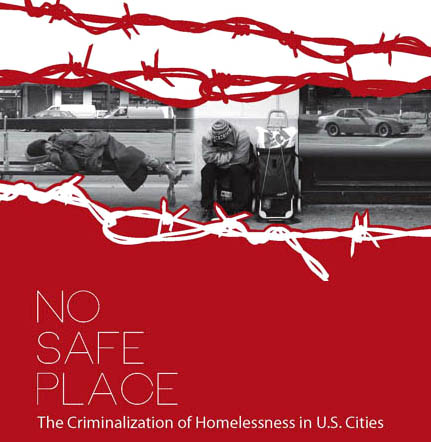by Jeremy Rosen
National Law Center on Homelessness & Poverty
[dropcap]W[/dropcap]ASHINGTON, DC — On July 16, the National Law Center on Homelessness & Poverty released a new report, “No Safe Place: The Criminalization of Homelessness in U.S. Cities.” The report details a startling rise in laws criminalizing homelessness across America.
More and more U.S. cities are criminally punishing homeless people for engaging in necessary, life-sustaining activity in public places, even when they have no other options.
“There is a severe shortage of affordable housing and a lack of emergency shelter options in our communities, leaving homeless people with no choice but to perform basic acts of survival in public spaces,” said Maria Foscarinis, executive director of the National Law Center. “Despite a lack of any available alternatives, more cities are choosing to turn the necessary conduct of homeless people into criminal activity. This is unconscionable.”
The number of laws restricting or prohibiting the basic human activities of homeless people has significantly increased in recent years, according to a survey of laws in 187 cities that the National Law Center has tracked since 2011. More than half of surveyed cities have laws restricting sitting or lying down in public, representing a 43 percent increase since 2011. Other criminalization laws have become even more prevalent. Laws prohibiting living in vehicles have increased by a dramatic 119 percent since 2011.
Research by the National Law Center on Homelessness & Poverty also shows that the increase has been most pronounced in citywide bans on basic activities, suggesting that the nature of criminalization is changing.
Rather than limiting criminalization laws to certain parts of the city, such as downtown commercial districts or tourist areas, more cities are banning these activities throughout the entire community, effectively making it illegal to be homeless anywhere in the city.

“Criminalization laws are the least effective and most expensive way for cities to address homelessness in their communities,” said Tristia Bauman, Senior Attorney at the National Law Center, and primary author of the report.
“Instead of wasting limited public resources on strategies that do nothing to address the underlying causes of homelessness, and are often illegal, cities would be much better served by pursuing sensible, cost-effective, and humane constructive alternatives to criminalization.”
The report recommends several of these solutions to homelessness, including investment in affordable housing and improved police training and practices.
For information, contact Jeremy Rosen at (202) 638-2535 x104, or jrosen@nlchp.org.
